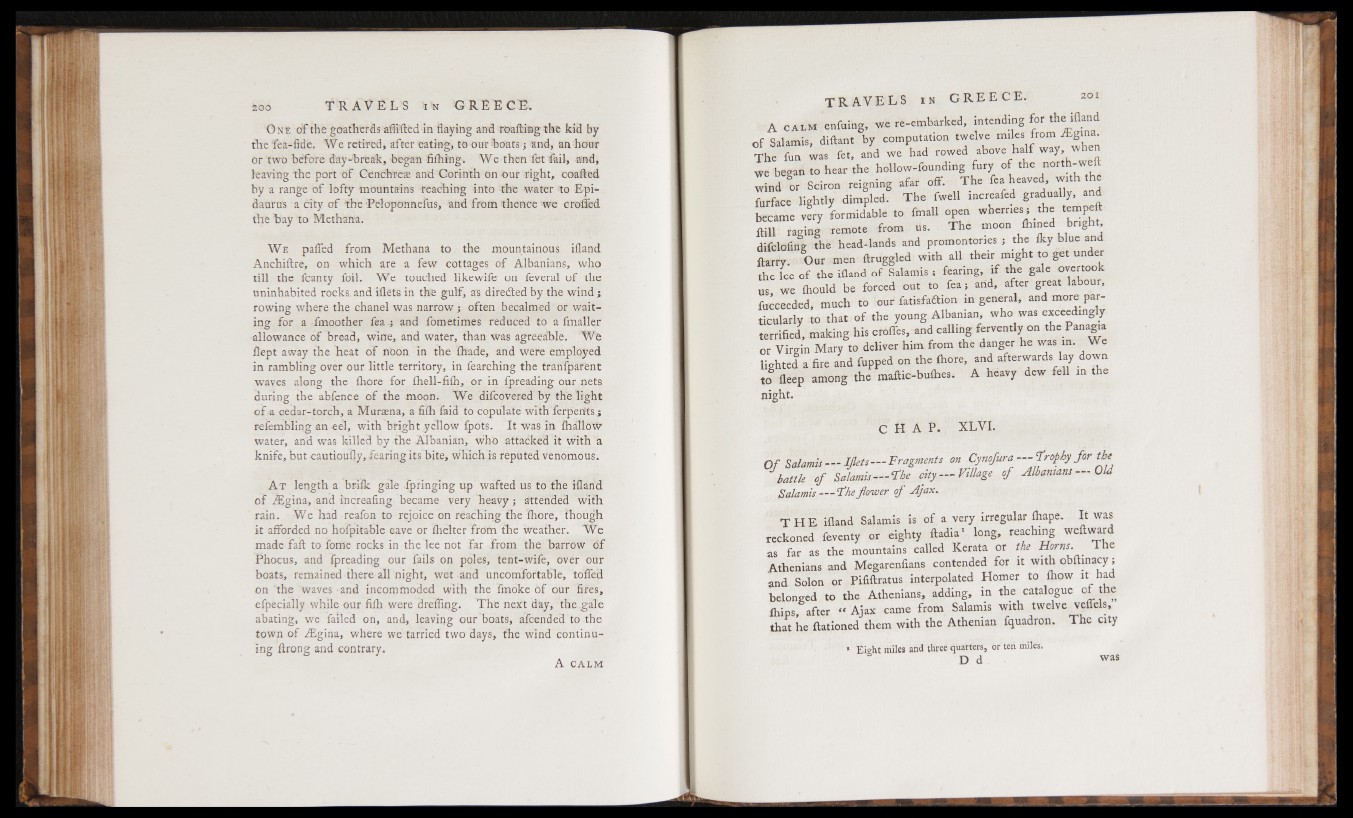
'ÖNfc of the goatherfls affifttd in flaying and ro&fthag the kid by
the fea-fide. ’W e rewfed, after eating, tö ottr 4>oats-3 and, an hönr
ör ‘twt> before day-hres!k5 began -fifhfng. 'We then 'iet t&il, and,
fearing the port -öf CenchveaB and Corinth ön our -tight, crafted
by a range o f lefty mountains -teaching into the water to Epi-
daartfs a d'ty of the Peloponnefus, and fr-otn thence w e croffed
the hay to Methafta.
W e paffed from Methana to, the mountainous ifland
Anchiftre, on which are a few cottages of Albanians, who
till the fcanty foil. We touched like wife on feveral of the
uninhabited rocks, and ifiëfs in thfc gulf, as directed by the wind j
rowing where the chanel was narrow j often becalmed or waiting
for a -fmoother fea^ and fometimes reduced to a fmaller
■ allowance of bread, wine, and water, than was agreeable. 'W~t
ffept away the heat o f noon in the ‘Öfade, and wéte employed
in rambling over our little territory, in fearching the tranTpfl'fent
waves along the fhore for fhell-fifh, or in fpreading our pets
during the abfence o f the moon. W e dilcovered' by the light
of-a oedar-torch, a Muraena, a fffti laid to copulate with'ferpei^s^
reïèmbïing an-eel, with btight yellow Ipots. It was jn fhaflbW
water, an'd was hilled by the-Albanian, who .afiackm it with'a
knife, butcautioully,fearinj;its'bite, wHichis reputed véhómpüs.
A t length a bnilk gale opringing up wafted us to the tfland
o f Angina, -and increafing became very heavy ; attended with
rain. We had reafon to rejoice on rëaching the thore,:’tnóügh
it afforded no hofpitable cave or Ihelter from the weather. W e
made fail to iorrfe rocks in the lee not far -from the barrow of
Phocus, and ipreadiijg our fails on poles, tent-wife, bvdr ott
boats, - remained there all night, wet-and uncomfortable, toffed
on ‘the waves -and ineomfnoÜed with the Tmóke Öf our hres,
efpecially while our fifh were drefling. The next day, the gale
abating, we failed on, and, leaving our boats, afcended to the
town o f iEgina, where wé tarried two days, flie wind continuing
ftrong and contrary.
A CALM
A cALfcl enfuihg, we re-e'mbdrked, intending for the ifland
of Salamis, diftant by computation twelve miles from jEgina.
W lt S ft«, » d we had rowed above b d f way when
we began to hear the hollow-foundmg fnry_ of the iaorth-r»e
wind br. Sciron reigning afar off. The ib.heaved with the
furfacu lightly dimpled. The fweU increafed gradually, and
became »ere formidable to flnaU open wherries s the
S i raging «mote from C The moon ^
difeWflg die head-lands and promontories J the Iky bine and
ftarfy. Oar .men ftrnggled. with att their might to get under
the lee o f the ifland of Salamis ; fearing, i f the gale pmrtook
us, we fhould be forced out to, fed! and, after great labour,
fccceeded, milch to lour fatisfaiaioa in general, and IM g jP g
ticularly -to that o f the young Albanian, who was exceedrngiy.
terrified, m aking his otoffes, and calling fervently on the Panama
or Vitkin Mary to deliver him fam M danger he was m. We
light J a fire, and flipped on the fhore, a j g
tog fleep among the maftic-buflKS. A heavy dew fell in (he
night.
d C f t A P. X L V l.
O f Salamis- - - Jfiets— Fragments on tynafura---trophy fo r t jx
battle ' f Salamis~---fhe c k y ^ ftlla g e s°£ Albanians Old
jj of Jjax*
T H E ifland Salamis is o f a very irregular fhape. It was
reckoned feventy or eighty ftadiaV long, reaching weft ward
as far as the mountains called Kerata or the Horns. The
Athenians and Megarenfians contended for it with obftinaey;
and Solon or Pififtratus interpolated Homer to fhow it had
belonged to the Athenians, adding, in the catalogue o f the
fliips, after «‘ Ajax came from Salamis with twelve veffels,
that he Rationed them with the Athenian fquadron. The city
i Eight miles and thred quarters, or ten mil«.
D d , was